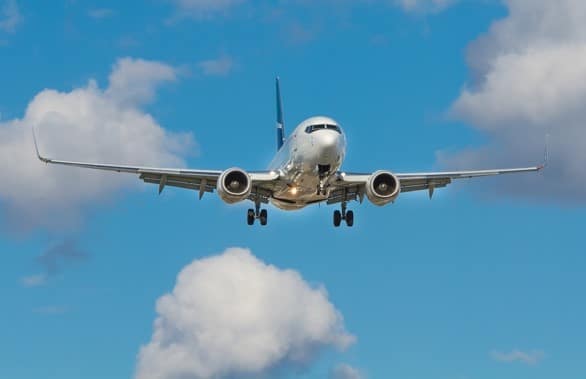Company: The Boeing Company
CEO: David L. Calhoun
Founder: William E. Boeing
Year founded: 1916
Headquarters: Chicago, Illinois, United States
Employees (Jan 2020): 161,100
Ticker Symbol: BA
Type: Public
Annual Revenue (FY2019): US$76.56 Billion
Profit | Net income (FY2019): US$-636 Million
Products & Services: Commercial Airliners | Private Jets | Light Aircrafts | Satellites | Air Defense Weapons | Security Systems | Helicopters | Global Services | Boeing Capital | Information and Communication Systems
Competitors: Airbus | Lockheed Martin | General Dynamics | GE Aviation | Industrial Select Sector | United Technologies | Northrop Grumman | Raytheon |
Fun Fact: Did you know that it takes about 50 gallons of paint to paint Boeing 737 Max?
Boeing is recognized globally for designing and manufacturing versatile airliners, jets, and light aircraft. From runaways in major cities across the world to rural farming communities, the impact of Boeing’s technologies is far-reaching.
With 104 years in the industry, we can learn a lot by analyzing Boeing’s strengths, weaknesses, opportunities, and threats (SWOT).
Here is an in-depth Boeing SWOT analysis.
Boeing’s Strengths
- Strong Market Share: Boeing is the second-largest aerospace company in the world having been overtaken by archrival Airbus in early 2020. It is one of the largest aircraft manufacturers in the defense, space, and security with contracts worth billions of dollars. Large size comes with economies of scale, influence, and unfair advantage.
- Highly Innovative: The aircraft manufacturer is the most innovative player in the industry and sets the standards for the rest to follow. Boeing revolutionized the airline industry with lightweight carbon-composites and innovative fuel efficiency technologies that enabled long-distance non-stop flights.
- Widest Variety: Boeing caters to a wide variety of customer needs from commercial airlines to corporate jets, and small personal jets. Any customer who wants a plane can get it from Boeing and will not be turned away or referred to Airbus.
- Strong Relationships: From local to international suppliers and partners, Boeing has nurtured strong and meaningful relationships. This is attributed to the company’s commitment to honor and recognize suppliers’ contributions to its success.
- Strategic Partners: In a technology-intensive industry, success depends on the number of partners as well as their technological prowess. Boeing has partnered with innovative technological powerhouses in relevant industries from many countries across the world.
- Robust Supply Chain: Building one 787 Dreamliner requires hundreds of parts outsourced from countries including Sweden, France. Italy, South Korea, Japan, Australia, China, and Canada. It outsources the manufacture of 70% of its parts and relies on a robust supply chain to ensure the timely delivery of each component.
Boeing’s Weaknesses
- Flawed and Unsafe Design: In 2019, Boeing 737 Max crashed twice in the Java Sea and Ethiopia killing all aboard. Both planes suffered the same malfunction attributed to a flaw in Boeing’s design of the 737 Max. Boeing’s flawed and unsafe design of 737 a major weakness.
- Over-Outsourcing: Boeing relies heavily on outsourcing the manufacture of the components and parts for its planes. The scale of Boeing’s outsourcing was highlighted recently after Spirit’s laid-off 2800 employees who worked primarily on the troubled 737 Max.
- Overdependence on US Contracts: While most other aircraft manufacturers rely on airlines, Boeing depends on contracts from the US government. With about 27% of its revenue coming from the US government contracts, Boeing is at the mercy of US politics and economic factors in the American market.
- Supply Chain Issues: Just any global operator, Boeing also faces several supply chain challenges attributed to its management strategies. This is a major weakness particularly for Boeing since it relies heavily on suppliers.
- Poor Labor Management: Firing employees because they formed a union shows ineffectiveness in labor management. This is exactly what Boeing did to its employees in South Carolina as part of its efforts to stifle a nascent union.
Boeing’s Opportunities
- Focus on Space Force: The launch of the US Space Force offers Boeing an opportunity to become the primary contractor for the US government. But first, it has to beat Lockheed Martin and Northrop Grumman.
- Exploit its Innovative Advantage: An effective way to capture more market share is by providing new and innovative solutions. Boeing can exploit its innovative advantage to deliver air mobility for the future and poach customers from competitors.
- Increasing Demand for Satellites: The demand for satellite technologies and launch services is increasing rapidly. Boeing is perfectly positioned to exploit both opportunities.
- Build Electric Planes: Boeing can use its resources and years of experience to deliver air-taxis to serve the soon-to-be-realized smart cities. It partnered with Uber to build air-taxis and can focus on similar projects or manufacture air-taxis independently.
- Flying Cars: Expanding into different niches offer a higher potential of growth but it requires strong partners. For instance, Boeing partnered with Volkswagen (Porsche) to build flying cars for the superrich.
- More Eco-Friendly Planes: To contribute global efforts to combat environmental pollution and climate change, Boeing embarked on a mission to reduce the carbon footprint of its planes. It is testing the latest cutting-edge technologies to lower emissions and noise pollution.
Boeing’s Threats
- Intense Competition: Airbus and Boeing are two big players and bitter rivals with the backing of the EU and the US respectively. Competition in the airline manufacturing sector is more complex since losing even a single customer or order can amount to losses in the millions.
- Public Perception: Once a specific airplane model has been involved in a crash and regulators have grounded the entire fleet due to safety concerns, the public can permanently associate it with a lack of safety. It is very difficult to convince the public that the flaw in 737 Max is fixed.
- The Pandemic: With the devastation, pain, and deaths due to the pandemic, most people would think twice before boarding a plane. The immediate threat is that the pandemic will bankrupt most airlines, forcing mass cancellations of their orders for Boeings.
- Looming Recession: Countries across the world are already deep into recession. Boeing’s commercial customers (for example, Southwest airlines) will struggle to stay afloat in times of economic crisis as consumers avoid non-essential travels or seek cheaper options like trains and buses.
- Terrorist Attack: The threat posed by terror groups hangs over all airlines as well as airplane manufacturers. In the aftermath of the 9/11 terror attack, air travel declined drastically with Boeing and Airbus incurring immense losses.
- Trade War: Airbus and Boeing are both caught in the middle of the US-EU trade tussle. With both factions across the pond vehemently protecting their interests, the hostilities can escalate forcing the EU to deny Boeing access to the lucrative European market.
- Cyber Security Threats: Currently, cyber-attacks by rogue nations, terrorists, and cybercriminals pose a major threat to airlines globally. Security systems of Boeing were leaked, which revealed the flaws and vulnerabilities of 787 that can be exploited by cyber-terrorists.
References
-
Explore useful content on business strategies & analysis at our website. Also, check out this page to know about Boeing SWOT Analysis, Fun Fact & more.
Trefis Team (2020, January 6). How Airbus Has Grown Over The Years To Dethrone Boeing As The Largest Commercial Aircraft Maker. Forbes - Topham, G. (2019, March 12). Boeing’s 737 Max wooed airlines with its cost-saving fuel economy. The Guardian
- Cummins, N. (2020, May 27). Why Do Boeing Plane Models Start & End With The Number 7? Simple Flying
- PR News (2018, April 12). Boeing Honors Suppliers for Outstanding Performance. Boeing Media Room.
- Media Room (2019, November 11). Boeing to Focus on Safety, Innovation, and Partnerships at 2019 Dubai Airshow. PR Newswire
- Flight International (2020, May 12). Why a strong supplier chain could save Boeing. Flight Global
- Morgan, B. (2019, September 25). How Far Are We From Flying Zero-Emission Airplanes? Forbes
- Levin, A. (2020, March 9). After the first 737 Max crash, why did Boeing’s pilot warning fail to stop the second plane from going down? Fortune
- Leonard M. (2020, January 13). Boeing supplier’s 2.8K layoffs highlight the scale of supply chain disruption. Supply Chain Dive
- Matt, D. (2019, March 16). U.S. and Boeing have long had a special relationship. The Washington Post
- Pierce. F. (2020, January 20). The Boeing 787 Dreamliner: A tale of TERRIBLE supply chain management. Supply Chain Digital
- Sainato, M. (2020, May 3). ‘It’s because we were union members’: Boeing fires workers who organized. The Guardian
- Erwin, S. (2020, March 4). Boeing, Lockheed win U.S. Space Force contracts to develop Satcom payloads. Space News
- Hornyak, T. (2020, March 7). The flying taxi market may be ready for takeoff, changing the travel experience forever. CNBC
- Globe News (2019, August 06). Global SATCOM Equipment for Space Market Forecast, 2019 to 2025. GLOBE NEWSWIRE
- Gibson, K. (2019, January 23). Boeing’s flying taxi lifts off on a first flight, bringing Uber Air closer to reality. CBS
- Hawkins, A. J. (2019, October 11). Porsche teams up with Boeing to build flying cars for rich people. The Verge
- Ryan, C. (2020, February 13). Airbus Presses Boeing Rivalry With Jet Deal, Production Ramp-Up. Transport Topics
- McCartney, S. (2019, June 5). Inside the Effort to Fix the Troubled Boeing 737 MAX. The Wall Street Journal
- Kotoky, A. (2020, March 16). Coronavirus Will Bankrupt Most Airlines by May Without Government Help, Analyst Warns. TIME
- Hepher, T. (2020, March 31). Global Airlines Expect Crisis to Persist to Late 2020. Reuters
- Engel, P. (2019, September 10). What happened on 9/11, 18 years ago? Business Insider
- Ekblom, J. (2019, October 2). Highlights of the 15-year Airbus, Boeing trade war. Reuters
- Greenberg, A. (2019, July 8). A Boeing Code Leak Exposes Security Flaws Deep in a 787’s Guts. Wired
- Featured image by Ethan McArthur on Unsplash
Tell us what you think? Did you find this article interesting?
Share your thoughts and experiences in the comments section below.












Add comment